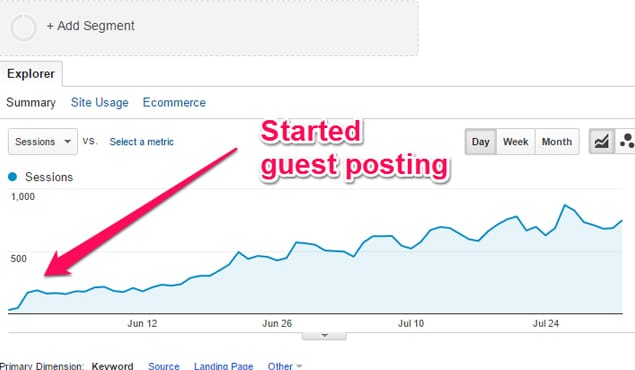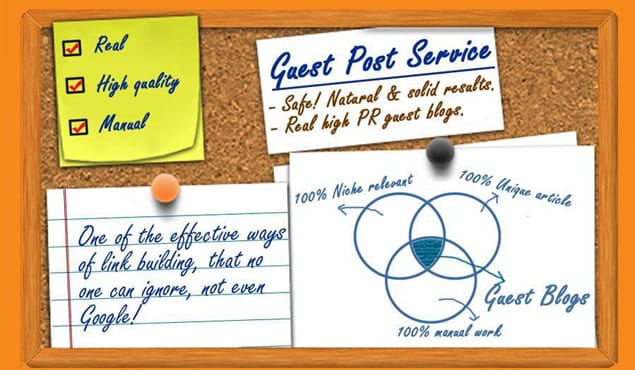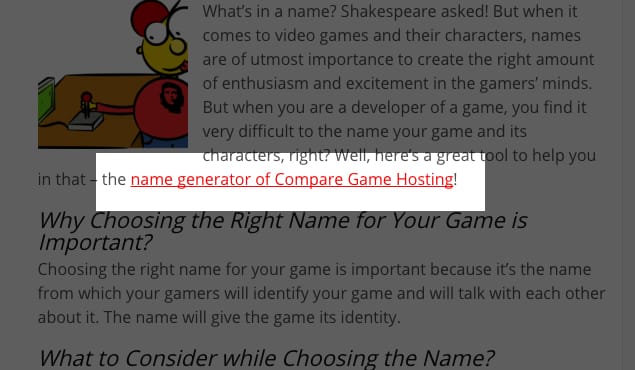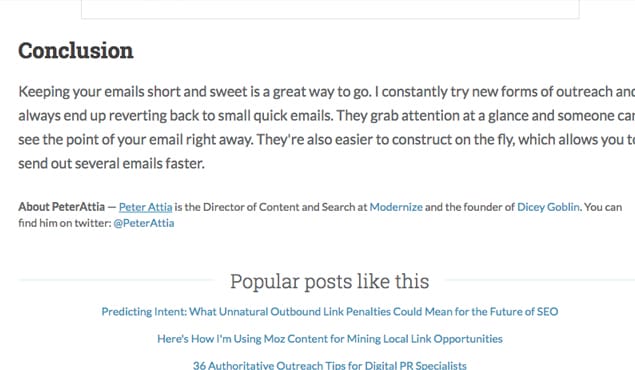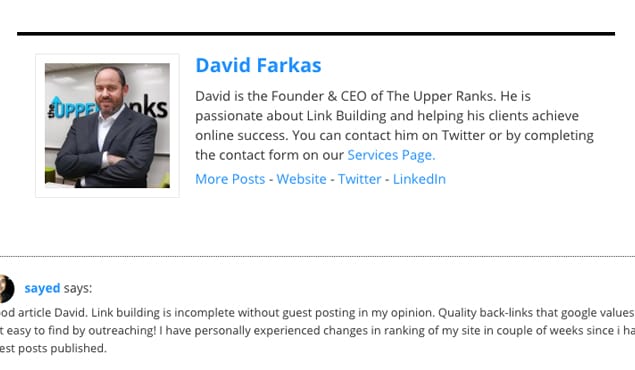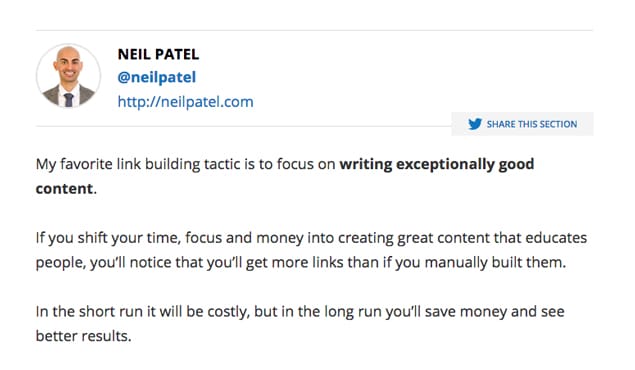The question of whether or not guest posting works as an SEO growth strategy has become a hotly debated topic since January of 2014, when Matt Cutts declared it officially dead. He said to stick a fork in it due to its doneness.
Most articles you’ll find on SEO and guest posting start by linking to that Matt Cutts article because it made waves in the industry. It was a clear alert to the massive community of bloggers that one of its top dogs was fed up with spammy wannabe guest posters, and he was calling everyone out on their tactics.
There are two things to consider, now, in 2016.
- It’s been more than two years since this proclamation, and yet guest posting still exists. Not to discredit Cutts in any way — he did change the way this system works — but guest posting far from done.
- Google has since updated its algorithms. In regards to guest posting and SEO building, the update made it much harder for those links to work, and actually asked all bloggers to set all links in guest blogs to nofollow. While some people adhere to this rule and others don’t, it’s a clear sign that the search giant wants you to stop supporting this tactic.
The Old SEO Growth Strategy
For those not entirely clear on how SEO growth and guest posts have worked together in the past, here’s the basic information.
You contact a blog with an audience to see if they want to publish an article under your authorship. If that blog says yes, you write an article for them. In the article you include a number of links that direct back to your own blog or website, which is usually a business. These links are set to “follow,” which basically means a web-crawler will count them as legitimate.
Not only does this encourage readers of your article on that blog to head back to your website, but it utilizes one of Google’s primary methods for ranking pages of authority. Backlinks are these links, and the more backlinks that refer to your website, the higher your page gets ranked in Google. If you have a number of backlinks from very reputable websites with high traffic, you are more likely to to rank higher.
It’s fairly simple, and was the bread and butter of guest posters for many years.
As you can see, this system can be easily exploited. It became the norm for thousands (or hundreds of thousands) of little blogs to blast email other blogs — small, medium, and large — offering to guest post. Before the method was widely frowned upon, people accepted this method of guest posting, which means your site would continually rise in the page ranks of Google.
Like any potentially exploitative process, the heyday for these tactics is over. Matt Cutts did call it, Google has called it, and the general vibe of bloggers online has called it.
Same Same, But Different
The common Thai-to-English phrase is pretty applicable to whether or not guest posting still works as an SEO growth strategy. The process is basically the same, but the context and mentality is different.
The short answer to whether or not it still works? Absolutely.
Better Links
The reality is that despite Google’s crackdown and the industry going sideways on the process, follow links are still embedded in guest posts every day on blogs of every niche. It’s a common practice to link out to any piece of relevant information — in fact, it’s so ubiquitous in today’s world that the idea of not having links in a guest post doesn’t make any sense.
The process of linking isn’t what the blog community (and Google) were upset about. The issue was that these guest posters were linking back to their website and products when those things had absolutely no bearing on the article or the blog on which the article appears.
A Bad Guest Post with Links
If you’re a guest poster who has asked and been accepted to write a post on goji berries, the hope is that your blog has something to with goji berries, and that you are an authority on the berry itself. What happened (and still happens) was that writers were claimed “experts” of everything. Writers could write on anything, as long as you let them.
The article on goji berries might be good, it might be terrible. But the follow links in said article would link back to a website on content marketing, or sunscreen, or maybe even blueberries, which is like goji berries but not the same thing.
The point here is that in the old days (and still today, for bad guest posters), those follow links had nothing to do with the article or blog they appeared on. This is sacrilege. Why would a reader want or need to be linked back to your unrelated product?
They wouldn’t.
This is a clear way to piss off your community of readers.
A Good Guest Post with Links
The above example would be much more legitimate if the writer was an actual expert in goji berries, had a blog dedicated to the medicinal properties of goji berries, and wrote an article in which every link in the article was relevant to the topic at hand.
This is the most basic and true method of being a great gust poster. Don’t write articles you’re not knowledgeable in, and don’t include links that have nothing to do with the topic at hand.
You might ask how this is supposed to build SEO if you don’t have any links back to your own website.
Well, there are two answers. One of them is that in black and white terms it doesn’t grow your SEO, which might piss you off. I’m OK with that, because as a writer myself it’s important to always include relevant links!
The second answer is that if you’re really a blog owner who writes in a specific niche and are writing a great guest post in that niche for someone else, you should be able to easily include a relevant link back to your own blog that makes sense.
Let’s say this article is about how to make goji berry shakes. Yum. Readers will love this article because it’s about consuming a product they love, it’s in the niche, and it might even include a recipe. Recipes are real hot right now.
Within this article you mention the fact that you’d want to put goji berries in a shake because of the number of positive medicinal qualities they have. Those words — “positive medicinal qualities” — could very easily be a link to an article about such medicinal properties.
Guess where that link should point to? Probably the comprehensive article you wrote on your own blog, titled “The Ultimate Guide to Goji Berry Medicinal Qualities.” This links back to your blog effectively, it helps the reader, and it builds your SEO.
How easy that was? Actually, it’s not easy. That seemingly simple step requires you to have written a comprehensive article, which means you need to have a solid amount of information on your blog and in your repertoire, including having done lots of research.
The concept of putting links in your guest post that link back to your own blog are totally viable — they just have to be relevant links. This means you have to have relevant things to link to.
It’s almost like guest posting in this legitimate way specifically weeds out the spammers who just want to build backlinks endlessly, because those people have no real expertise or websites to back them up.
If you’re catching my tone here, good. Don’t be one of those people.
The Byline
Beyond inserting relevant links in your articles, the next-best method of establishing SEO growth with guest blogging is the byline.
If you’re a guest poster, make sure every single article you write includes a byline. Whether it’s a special author box that has your picture and name offset and easily readable, or a small italic paragraph at the end of the article, the byline is essential for the growth of your website.
After all, you are writing this guest post to boost your visibility, whether through SEO or other methods, in addition to putting great content up on the web.
The byline is a built-in follow link that the blog you’re writing for one won’t have gripes with. Well, some of them will, because some blogs are strict and don’t allow any self promotion what-so-ever. If that’s the case, make sure you know that before you pen an epic post for them.
This concept is really simple. A byline typically includes your name, your website, and what kind of business you have or information you write about. If you’re really good (and the blog you’re guesting for allows it) you could probably fit 3-4 links in your byline, though this may come off as spam.
At the very least you will get one follow link that goes back to your blog — i.e., “John Johnson writes for Your Daily Goji, enjoys early morning smoothies, and the occasional juice cleanse.” The “Your Daily Goji” will link back to John Johnson’s website of the same name.
This is all very legitimate and can be very effective.
Actionable Bylines
As an aside, it’s also important to create an actionable byline. I won’t elaborate on this concept in full because it’s not entirely related to SEO, but rather reader retention. There are ample guides on how to create actionable bylines effectively.
For our purposes here you should know that a link back to your website homepage in your byline will help SEO, but a link back to a page that asks readers to subscribe, get a free ebook, or engage in some other way with you will greatly increase the click-through rate and retention.
This means your readership will go up right alongside your SEO, which is the double whammy for success.
More than SEO
Hopefully it has become clear to you in reading this that the best way to go about this is to write killer articles. A guest post that rocks will get you and the blog you write it for tons of traffic, which is always a good thing.
There’s one more concrete way SEO is built through great articles.
Other Sites Reference You
If you write an authoritative and comprehensive article in your niche, even if it’s for someone else, other sites will refer to you. Just like you should link to articles that will help readers further understand your topic (like goji berries), if your article is good enough other blogs and news sources will start linking to you.
You can allow this to happen passively; if your article is good enough it will, and you’ll start to see a traffic bump on your own site and probably get a “nice work” from that blog you wrote the post for originally.
You can also pursue it actively. If your post really does highlight something new or supersede any other information out there, feel free to email other sites in your niche about the new resource you’ve provided. Coordinate with the blog you wrote it for to make sure both of you aren’t sending the same email to the same sources, but dropping a line is never a bad thing.
If you really want to up the game, in your email reference 2-3 articles on the site of the blog or news-mill you’re emailing that could link to your new article. The editors might not be willing to insert links after publication, but a lot of them will. Even if they won’t, it will put your article in the back of their mind for future publications.
Yes, this will build the SEO of the blog you wrote the article for, but if you have a byline and other embedded links back to your own blog in that article, it will improve your SEO and mentions too.
Community Building
Guest posting is a collective community building process. Doing the above will help to create a community around not just you and your site, but other websites in your niche. You want to work together, not against each other, even if you’re competing a little bit.
Hopefully the actual product you’re selling is different than the sites you are writing for, so when people do click back to your website they might purchase something.
While SEO growth through guest posting is possible, necessary, and powerful, what’s more powerful is the relationships you build with readers and industry leaders.
The whole point of SEO growth is to be featured on the first page of Google, which means more people will find your site. If you use these guest posts to build a reputable voice in your industry then people will also find your site.
It’s a method that hits two goals with one wordy stone.
Wrapping Up
The relevance of guest posting for SEO growth is far from over, but it’s now, more than ever, about authenticity in your field. Get out there and grow that goji berry site — or whatever it is you’re an expert in.
 ContentPowered.com
ContentPowered.com
